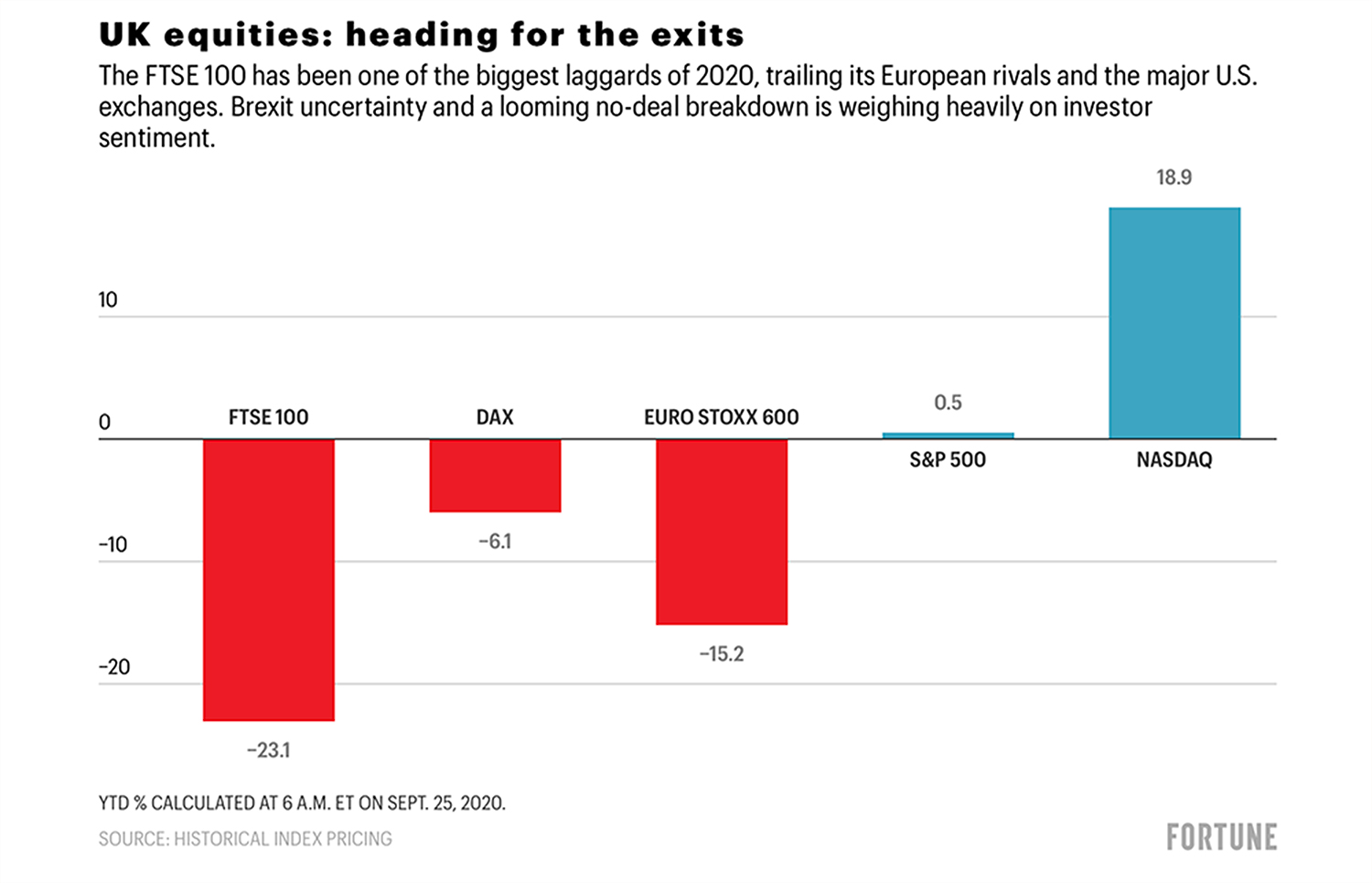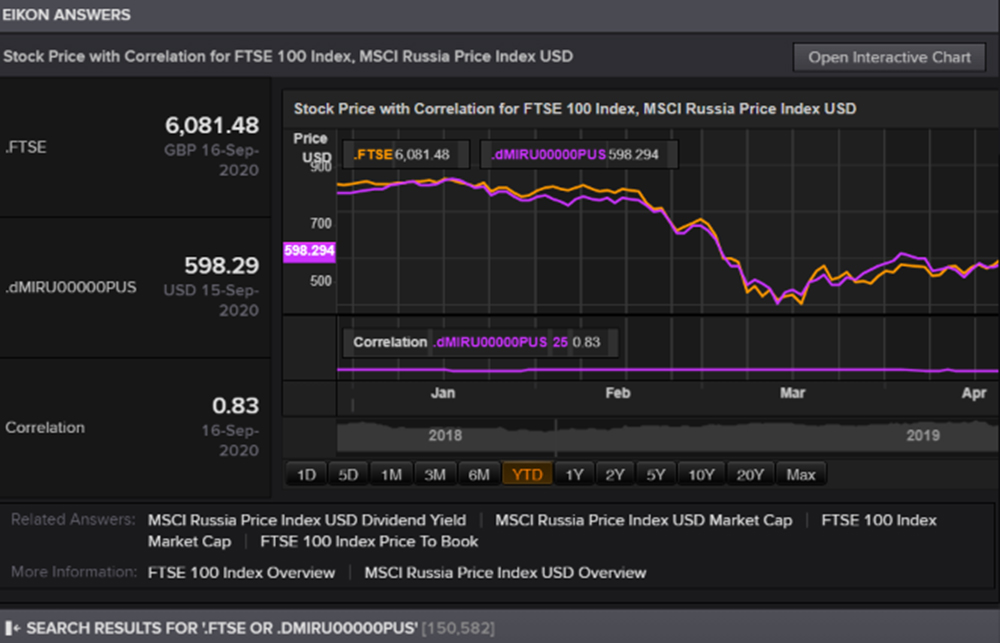A国有全球历史最悠久的股票交易所,有可靠的法治基础,为投资者提供了严格的保护。
B国实质上是一个石油国家,各项金融自由指数都很低。该国近期向市场化经济转型的过程并不顺利,推动民主进程和准则的过程也备受人权组织批评。例如,B国总统最近修改了宪法,将任期延长了数十年,并且外界普遍怀疑他经常毒害政治对手。
但对投资者来说,这两个国家很难区分。它们都是会把你的闲钱套牢的可怕的地方。
你或许已经猜到了,B国就是俄罗斯。那么A国呢?A国是英国。
今年3月,看涨英国股票的投资者,难以置信地看着自己投资的股票突然暴跌,同样让他们大跌眼镜的是,英国股市竟然没有恢复到其他欧洲市场的水平。
盛极一时的富时100指数,从年初至今下跌了约23%,其表现几乎落后于所有欧洲主要交易所,更无法与主要的美股指数相提并论。

事实上,这种表现只有在新兴市场才能够见到。富时100指数在2020年年初至今的表现(-23.1%),在巴西(-16%)和智利圣地亚哥IPSA指数(-26%)之间。
但路孚特理柏(Refinitiv Lipper)的英国与爱尔兰市场研究负责人德维•约翰认为,表现糟糕的富时100指数与摩根士丹利资本国际(MSCI)俄罗斯指数类似。
他表示:“与富时100指数的表现最接近的是MSCI俄罗斯指数,两者的相关系数达到0.83,非常接近。”
他分享的股票走势图显示,从年初至今,伦敦和莫斯科的股票走势非常接近。(注:富时100指数为橘色;MSCI俄罗斯指数为紫色。)

两个指数的表现如此接近,让约翰感到非常震惊。他补充说,这两个国家作为投资选择,是完全不同的。
他说,俄罗斯股票波动性更大,莫斯科交易所“流动性更差,股票种类更少。”在莫斯科上市的公司50%左右是能源公司。自新冠疫情爆发以来,全球能源类资产一直是表现最差的股票之一。
与此同时,“英国却有全球规模最大、流动性最好的交易所。英国市场资产种类丰富,并且法治基础牢固。英国对投资者提供全球最高水平的保护。俄罗斯在这方面无法与英国相提并论。”
莫斯科股市以能源股为主,伦敦则主要是金融股和医疗股。今年,金融股表现低迷,但医疗股在3月跌入低谷之后已经反弹。
两个交易所有一个惊人的相似之处:高增长的科技股较少。
史上最低
投资新兴市场,比如金砖国家,如果选择的时机恰当,就能带来巨额回报。当然,投资金砖国家的风险更高,但这也意味着潜在回报更高。
市场专家很少看到英国股市像新兴市场一样,高风险与高回报并存。事实恰恰相反。
从今年的表现来看,富时指数一直存在一种“避险”的情绪。本月早些时候,根据MSCI全球指数,富时指数跌至历史新低,对于一个不久前还被认为是欧洲经济发动机的国家来说,如此糟糕的表现令其蒙羞。如今,欧洲经济的发动机变成了德国。事实上,上个月,蓝筹指数Dax的表现胜过了三大美股指数。
而倒霉的英国股票没有吸引到太多外部投资者。据高盛(Goldman Sachs)统计,截至9月16日,过去四周内,投资者从英国股市总共撤走资金6.45亿美元。这些资金被投资到哪些领域?首先是欧洲大陆国家和美国的股票。
信安环球投资基金(Principal Global Investors)的首席投资策略师西玛•沙告诉彭博社:“我们认为英国是一个价值陷阱。股票的估值或许很有吸引力,但基本面很糟糕。”
与其他有投资价值的股票相比,英国股票显然并不占优势。投资者认为英国股票面临三重风险:疫情带来的不确定性、经济二次探底,以及即将到来的脱欧带来的灾难。
这些都预示着英国经济和英国股票面临着大麻烦。贝伦贝格银行(Berenberg Bank)的高级经济学家卡鲁姆•皮克林在9月26日发布的一篇投资者报告中写道:“与疫情相关的不确定性,以及英国与欧盟之间艰难的贸易谈判和在2020年12月31日硬脱欧,直接退出欧盟单一市场带来的混乱,预示着英国今年将面临严峻的挑战。在最糟糕的情况下,第二轮全国封锁和毫无秩序地退出单一市场,会使英国经济第二次陷入衰退。我们将其视为尾部风险,而不是基准情景。”
经济学家和分析师都认为英国在无贸易协定的情况下脱欧的可能性大幅提高,在这种背景下,英国资产出现了史上最差的行情。随着新冠疫情愈演愈烈和对英国脱欧的担忧加剧,本月,英镑兑美元贬值超过5%。英镑也代表了投资者的需求。
与此同时,唐宁街的政客们依旧在宣扬“不计后果完成脱欧”的承诺。
但投资者们却已经主动开始与英国脱钩。
路孚特理柏的约翰说:“英国政府信心满满。但市场似乎并不认同他们的观点。”(财富中文网)
翻译:刘进龙
审校:汪皓
A国有全球历史最悠久的股票交易所,有可靠的法治基础,为投资者提供了严格的保护。
B国实质上是一个石油国家,各项金融自由指数都很低。该国近期向市场化经济转型的过程并不顺利,推动民主进程和准则的过程也备受人权组织批评。例如,B国总统最近修改了宪法,将任期延长了数十年,并且外界普遍怀疑他经常毒害政治对手。
但对投资者来说,这两个国家很难区分。它们都是会把你的闲钱套牢的可怕的地方。
你或许已经猜到了,B国就是俄罗斯。那么A国呢?A国是英国。
今年3月,看涨英国股票的投资者,难以置信地看着自己投资的股票突然暴跌,同样让他们大跌眼镜的是,英国股市竟然没有恢复到其他欧洲市场的水平。
盛极一时的富时100指数,从年初至今下跌了约23%,其表现几乎落后于所有欧洲主要交易所,更无法与主要的美股指数相提并论。
事实上,这种表现只有在新兴市场才能够见到。富时100指数在2020年年初至今的表现(-23.1%),在巴西(-16%)和智利圣地亚哥IPSA指数(-26%)之间。
但路孚特理柏(Refinitiv Lipper)的英国与爱尔兰市场研究负责人德维•约翰认为,表现糟糕的富时100指数与摩根士丹利资本国际(MSCI)俄罗斯指数类似。
他表示:“与富时100指数的表现最接近的是MSCI俄罗斯指数,两者的相关系数达到0.83,非常接近。”
他分享的股票走势图显示,从年初至今,伦敦和莫斯科的股票走势非常接近。(注:富时100指数为橘色;MSCI俄罗斯指数为紫色。)
两个指数的表现如此接近,让约翰感到非常震惊。他补充说,这两个国家作为投资选择,是完全不同的。
他说,俄罗斯股票波动性更大,莫斯科交易所“流动性更差,股票种类更少。”在莫斯科上市的公司50%左右是能源公司。自新冠疫情爆发以来,全球能源类资产一直是表现最差的股票之一。
与此同时,“英国却有全球规模最大、流动性最好的交易所。英国市场资产种类丰富,并且法治基础牢固。英国对投资者提供全球最高水平的保护。俄罗斯在这方面无法与英国相提并论。”
莫斯科股市以能源股为主,伦敦则主要是金融股和医疗股。今年,金融股表现低迷,但医疗股在3月跌入低谷之后已经反弹。
两个交易所有一个惊人的相似之处:高增长的科技股较少。
史上最低
投资新兴市场,比如金砖国家,如果选择的时机恰当,就能带来巨额回报。当然,投资金砖国家的风险更高,但这也意味着潜在回报更高。
市场专家很少看到英国股市像新兴市场一样,高风险与高回报并存。事实恰恰相反。
从今年的表现来看,富时指数一直存在一种“避险”的情绪。本月早些时候,根据MSCI全球指数,富时指数跌至历史新低,对于一个不久前还被认为是欧洲经济发动机的国家来说,如此糟糕的表现令其蒙羞。如今,欧洲经济的发动机变成了德国。事实上,上个月,蓝筹指数Dax的表现胜过了三大美股指数。
而倒霉的英国股票没有吸引到太多外部投资者。据高盛(Goldman Sachs)统计,截至9月16日,过去四周内,投资者从英国股市总共撤走资金6.45亿美元。这些资金被投资到哪些领域?首先是欧洲大陆国家和美国的股票。
信安环球投资基金(Principal Global Investors)的首席投资策略师西玛•沙告诉彭博社:“我们认为英国是一个价值陷阱。股票的估值或许很有吸引力,但基本面很糟糕。”
与其他有投资价值的股票相比,英国股票显然并不占优势。投资者认为英国股票面临三重风险:疫情带来的不确定性、经济二次探底,以及即将到来的脱欧带来的灾难。
这些都预示着英国经济和英国股票面临着大麻烦。贝伦贝格银行(Berenberg Bank)的高级经济学家卡鲁姆•皮克林在9月26日发布的一篇投资者报告中写道:“与疫情相关的不确定性,以及英国与欧盟之间艰难的贸易谈判和在2020年12月31日硬脱欧,直接退出欧盟单一市场带来的混乱,预示着英国今年将面临严峻的挑战。在最糟糕的情况下,第二轮全国封锁和毫无秩序地退出单一市场,会使英国经济第二次陷入衰退。我们将其视为尾部风险,而不是基准情景。”
经济学家和分析师都认为英国在无贸易协定的情况下脱欧的可能性大幅提高,在这种背景下,英国资产出现了史上最差的行情。随着新冠疫情愈演愈烈和对英国脱欧的担忧加剧,本月,英镑兑美元贬值超过5%。英镑也代表了投资者的需求。
与此同时,唐宁街的政客们依旧在宣扬“不计后果完成脱欧”的承诺。
但投资者们却已经主动开始与英国脱钩。
路孚特理柏的约翰说:“英国政府信心满满。但市场似乎并不认同他们的观点。”(财富中文网)
翻译:刘进龙
审校:汪皓
Country A is home to one of the oldest stock exchanges in the world where the rule of law is rock solid, and investors are afforded rigorous protections.
Country B is essentially a petrol state that ranks low on various financial freedom indexes. Its relatively recent transition to a market-based economy has been bumpy, and its embrace of democratic processes and norms has been widely criticized by human rights groups. Country B's President, for example, recently changed the constitution to extend his rule by decades and is widely suspected of routinely poisoning his political foes.
And yet to investors, the two countries are widely indistinguishable. They're both seen as a lousy place to sink your spare cash.
You've probably guessed Country B is Russia. And Country A? That's the United Kingdom.
Investors who are long U.K. equities watched incredulously in March as their portfolios sank precipitously and have watched with just as much surprise as it's failed to recover to the levels of its European peers.
Down roughly 23% year to date, the once mighty FTSE 100 is underperforming just about every major European exchange and is miles behind the major U.S. indexes.
In fact, you have to head to emerging markets to find a comparable performance match. The FTSE 100 (negative 23.1%) sits between Brazil (-16%) and Chile's Santiago IPSA (-26%) in YTD performance for 2020.
But Dewi John, head of research, United Kingdom & Ireland, at Refinitiv Lipper, sees troubling parallels with another index—that of the MSCI Russia.
"The FTSE 100 performance's closest match is to MSCI Russia, an .83 correlation, which is tight," he notes.
He shared this stock chart, which shows the London and Moscow shares in near lockstep since the start of the year. Note: The FTSE 100 index is in orange; the MSCI Russia index is in purple.
The matchup astounded John, adding that the two countries, as investment options, couldn't be any more different.
Russian stocks are more volatile, the Moscow exchange "more illiquid, and the breadth of stocks is more shallow," he said. Roughly 50% of Moscow-listed companies are energy companies, which as a global asset class has been one of the worst performers since the start of the COVID-19 outbreak.
Meanwhile, "the U.K. is home to one of the largest, most liquid exchanges. It has incredible breadth and has a really strong rule of law. Investors' protection is regarded as one of the highest in the world. You certainly wouldn’t say the same thing about Russia."
Where Moscow is strong in energy, London is strongly weighted to financials and health care. Financials have been a dud this year, but health care stocks are well off their March lows.
The one area where the two exchanges are woefully similar: They are both light on high-growth tech stocks.
All-time low
Investing in emerging markets, such as the BRIC countries, can bring huge returns if timed correctly. The risk is higher, of course, but so too is the potential return.
Few market pros sees such an EM-style return coming from British stocks. In fact, they see just the opposite.
Judging by this year's performance, the FTSE has a risk-off cloud hanging over it. Earlier this month, the FTSE hit an all-time low against the MSCI World, a humiliating underachievement for an economy that not long ago was seen as an engine of the European economy. That distinction today goes to Germany. In fact, the blue-chip Dax had been outperforming all three major U.S. indexes over the past month.
Down-on-their-luck U.K. equities, meanwhile, are attracting few outside bidders. According to Goldman Sachs, investors pulled a combined $645 million out of U.K. stocks over the past four weeks, ending Sept. 16. Where did they put their money? In continental European and U.S. equities, for starters.
“We see the U.K. as a value trap,” Seema Shah, chief strategist at Principal Global Investors, told Bloomberg. “Valuations might be attractive, but fundamentals are not.”
U.K. stocks are clearly at a disadvantage to other value plays. Investors see in them a triple whammy of risks: the uncertainty of a pandemic, a double-dip recession, and, on the horizon, a calamitous divorce with its European trading partners.
All of it points to trouble ahead for the U.K. economy and for U.K. stocks. "Uncertainties linked to the pandemic, as well as the difficult ongoing U.K.-EU trade talks and the threat of a disorderly hard exit from the EU single market on 31 December 2020, point to a challenging year end for the U.K.," wrote Berenberg Bank senior economist Kallum Pickering in an investor note on September 26. "In the worst-case scenario, a second nationwide lockdown, combined with a messy exit from the single market, could tip the U.K. economy back into recession. We view this as a tail risk, not as our base case."
As economists and analysts up the odds of a Brexit break from Europe sans trade deal, the worse U.K. assets perform. The pound sterling, another proxy for investor demand, has lost more than 5% of its value against the dollar this month as COVID and Brexit fears intensify.
Meanwhile Downing Street politicians continue to dial up the volume on their pledge of “getting Brexit done, and hang the consequences.”
At the same time, investors have already pulled off a Brexit of their own.
"The U.K. government is speaking in a bullish fashion. Markets don’t seem to agree," says John of Refinitiv Lipper.






